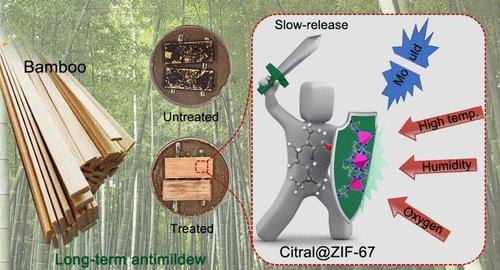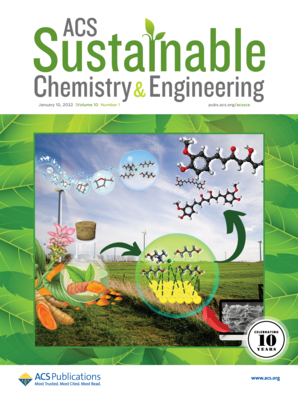Citral Encapsulated into a Zeolite Imidazolate Framework-67 (ZIF-67) Cage via Biomimetic Mineralization as an Efficient Preservative for Long-Term Antimildew Efficacy of Bamboo
IF 7.1
1区 化学
Q1 CHEMISTRY, MULTIDISCIPLINARY
引用次数: 0
Abstract
Natural mildew preventives, like citral, have great potential to protect bamboo from mildew, while their long-lasting antimildew performance is yet to be challenged owing to their oxidability and volatility. Inspired by biomimetic mineralization, in this work, citral@ZIF-67 particles were synthesized by encapsulating citral into a zeolite imidazolate framework-67 (ZIF-67) cage and introduced into a bamboo structure. Benefiting from the unique cage structure and large surface area of ZIF-67, it can encapsulate sufficient citral molecules. The encapsulation reduced the particle size of ZIF-67 due to the nucleation of citral. Furthermore, the surface area, pore size, and volume of citral@ZIF-67 particles gradually decreased with the increase in loading amounts of citral. ZIF-67 exhibited a certain antibacterial ability against E. coli and S. aureus. The encapsulation of citral can further enhance the antibacterial activity of ZIF-67. In addition, the citral@ZIF-67 showed slow-release performance that followed the Fickian diffusion mechanism. After the citral@ZIF-67 treatment, bamboo showed no mold spots on the surface with an infection grade of 0, which was retained, even though bamboo was conditioned at 50 °C and 85% relative humidity for 10 days. This proposed method can effectively improve the stability of natural mildew preventives and endow bamboo with long-term antimildew properties with low cost and minimized environmental impacts.

通过仿生矿化作用将柠檬醛封装到沸石咪唑啉框架-67 (ZIF-67) 笼中,作为一种有效的防腐剂,实现竹子的长期防霉功效
柠檬醛等天然防霉剂在保护竹子免受霉菌侵害方面具有巨大潜力,但由于其易氧化和易挥发的特性,其持久防霉性能仍有待挑战。受仿生物矿化的启发,本研究通过将柠檬醛封装到沸石咪唑框架-67(ZIF-67)笼子中,并将其引入竹子结构中,合成了柠檬醛@ZIF-67 颗粒。由于 ZIF-67 具有独特的笼状结构和较大的比表面积,因此可以封装足够的柠檬醛分子。由于柠檬醛的成核作用,这种包囊降低了 ZIF-67 的粒径。此外,随着柠檬醛负载量的增加,柠檬醛@ZIF-67 颗粒的表面积、孔径和体积逐渐减小。ZIF-67 对大肠杆菌和金黄色葡萄球菌具有一定的抗菌能力。柠檬醛的包囊可以进一步提高 ZIF-67 的抗菌活性。此外,柠檬醛@ZIF-67 还具有遵循费克扩散机制的缓释性能。经柠檬醛@ZIF-67 处理后,竹材表面无霉斑,感染等级为 0,即使在 50 °C 和 85% 相对湿度条件下放置 10 天,霉斑仍能保持。该方法可有效提高天然防霉剂的稳定性,并赋予竹子长期防霉特性,而且成本低廉,对环境的影响最小。
本文章由计算机程序翻译,如有差异,请以英文原文为准。
求助全文
约1分钟内获得全文
求助全文
来源期刊

ACS Sustainable Chemistry & Engineering
CHEMISTRY, MULTIDISCIPLINARY-ENGINEERING, CHEMICAL
CiteScore
13.80
自引率
4.80%
发文量
1470
审稿时长
1.7 months
期刊介绍:
ACS Sustainable Chemistry & Engineering is a prestigious weekly peer-reviewed scientific journal published by the American Chemical Society. Dedicated to advancing the principles of green chemistry and green engineering, it covers a wide array of research topics including green chemistry, green engineering, biomass, alternative energy, and life cycle assessment.
The journal welcomes submissions in various formats, including Letters, Articles, Features, and Perspectives (Reviews), that address the challenges of sustainability in the chemical enterprise and contribute to the advancement of sustainable practices. Join us in shaping the future of sustainable chemistry and engineering.
文献相关原料
公司名称
产品信息
阿拉丁
ethanol
阿拉丁
methanol
阿拉丁
citral
阿拉丁
2-methylimidazole
阿拉丁
Cobaltous nitrate hexahydrate
 求助内容:
求助内容: 应助结果提醒方式:
应助结果提醒方式:


